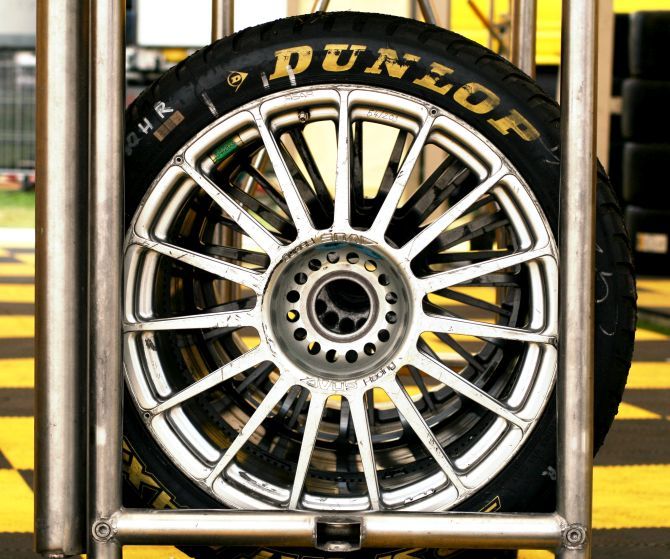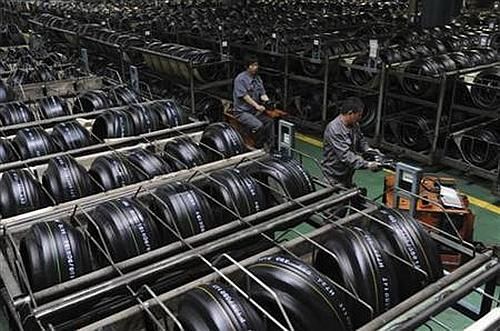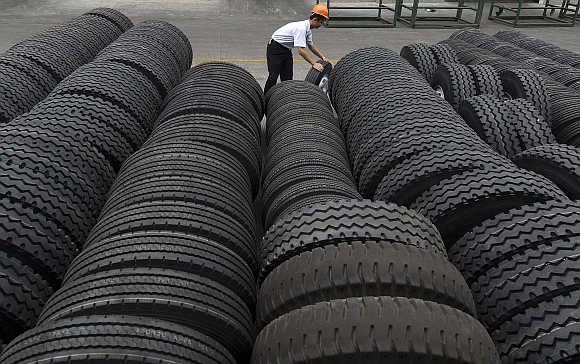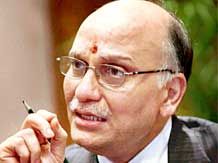Dunlop's journey from dominance to dereliction is a reflection of India's business history over the past 40 years.

Dunlop is Dunlop. Always Ahead. In 2014, the statement can only provoke a disbelieving smirk.
But in the 1980s, no one laughed when Dunlop India confidently adopted that arrogant tagline as part of its ad campaign.
In those days, Dunlop was the undisputed leader with about one-third market share.
By the 2000s, the brand had all but vanished from tyre dealers' showrooms, and a winding-up petition is under review in the Supreme Court.
Dunlop's journey from dominance to dereliction is a reflection of India's business history over the past 40 years.
Set up at the end of the British Raj in 1936, Dunlop saw its heydays in the protectionist 1970s, but its journey downhill began in the 1980s, when the British owners exited following new foreign exchange controls.
Partial relaxation of the licence raj saw domestic competition roll in from leaner, nimbler competitors like MRF and CEAT.

Today, the irony is that even as the company is struggling for its existence, the brand, which inherited its name from the Scotsman John Boyd Dunlop, who developed the pneumatic tyre, is still alive in people's minds.
No tyres of any description have rolled out of its factories in Sahagunj (West Bengal) or Ambattur (Tamil Nadu) since 2011 and 2012, respectively.
It is owner Pawan Ruia's Falcon Tyres (once owned by one of Dunlop's former owners, Manu Chhabria) that supplies "Dunlop" tyres to the market under a brand-sharing agreement.
But today, its market share is just 2.6 per cent. When Dunlop set up its 239-acre plant in Sahagunj, about 75 km north of then-Calcutta, it was one of the most potent symbols of the city's prosperous boxwallah culture.
The company's near-monopoly was shielded by high tariff walls, and it was able to cater to everything from the humble bicycle to heavy vehicles and aeroplanes - at one point, manufacturing 300 kinds of tyres.
Such was its standing that on a state visit, in 1980, Prince Charles drove down to Sahagunj for a visit. A stone plaque next to a Devdaru tree that he had planted bears witness to the royal visit.

In 1984, Manu Chhabria, the Dubai-based takeover tycoon and city-based R P Goenka acquired Dunlop.
That turned out to be a tough year for the tyre market but Dunlop managed to stay ahead of the curve. The new management, with Chhabria as chairman and Goenka's younger son, Sanjiv Goenka, as deputy managing director, initially made some sensible changes to the business.
"From the large product basket, we identified key focus areas - passenger cars, scooters, trucks and aeroplanes," says a former senior manager.
"It paid off. From number five among the major tyre manufactures, comprising Modi, Apollo, MRF and Ceat, Dunlop regained its number one position in 1987." Sahagunj also saw some upgraded technology, beginning with the introduction of the steel-belted tyre.
Soon after, Dunlop launched its famous marketing campaign. But it did not stay ahead for long.
A tumultuous working relationship between Chhabria and Goenka finally culminated in the latter's exit from the company.
Chhabria, an electronic goods dealer from Dubai, was scarcely a model owner, and showed little ability to run the many, often valuable, companies he was acquiring in India at the time, liquor major Shaw Wallace among them. His mismanagement played into the hands of the labour unions, the bane of industrialists in Left-ruled Bengal.
In 1996, the Dunlop and Shaw Wallace unions made a joint representation to the finance minister and the Prime Minister's Office, seeking Chhabria's removal.
 By 2000, Sahagunj was closed, and Ambattur was limping and Dunlop, the brand, dropped out of reckoning. In 2005 chartered accountant-turned-businessman
By 2000, Sahagunj was closed, and Ambattur was limping and Dunlop, the brand, dropped out of reckoning. In 2005 chartered accountant-turned-businessman
Pawan Ruia (see left) bought Dunlop from the Chhabria family (Manu Chhabria died in 2002) and Sahagunj was reopened with much fanfare in 2006.
Ruia managed to take Dunlop out of the purview of the Board for Industrial and Financial Reconstruction in 2007 and later relisted its shares on the Bombay Stock Exchange in 2010. But Dunlop's operations never really revived, with Falcon Tyres taking up the slack.
The Sahagunj factory, on reopening, did not see a single day of full production.
The plant recorded an average daily production of about five to 10 tonne. The capacity was of 90 tonne per day.
Operations were riddled with stop-work notices due labour issues, and then closure in March, 2008 as electricity supply was cut oweing to accumulated dues. Since, 2010 onwards there was hardly any production. "I could not control labourers who never wanted the plant to run.
Also, there was theft," Ruia claims. In 2011-12, managment shut down both the plants, citing labour issues.
By 2013, the courts put an order to wind up the company on the application of creditors under review.
After securing state government support in the form of a "relief undertaking" status (which means creditors cannot claim any dues from the company), Ruia still hopes to revive the company whose value lies only in its sprawling real estate. At any rate, no one can accuse Ruia of suffering from excessive pessimism.
But one thing is certain: With a dozen of brands jostling for space in a highly competitive tyre market today, brand Dunlop has left its best days far behind.
In his winding-up order Calcutta High Court judge, Justice Sanjib Banerjee noted in the opening line, "The wheel appears to have turned full circle for this industrial giant."











